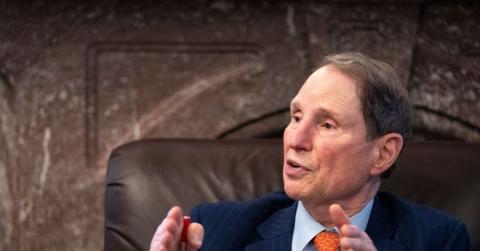Is the Billionaire Tax Constitutional? A Look at the Democratic Proposal To Tax Billionaires’ Wealth
Democrats are trying to approve a proposal that would tax billionaires on unrealized capital gains of tradeable assets.
Oct. 28 2021, Published 11:15 a.m. ET

Part of Joe Biden’s multitrillion-dollar infrastructure plan includes a way to pay for it: taxing the rich. The so-called billionaire tax is Biden’s proposed strategy for financing much of the hefty price tag of his infrastructure bill, but even if the math adds up, tax experts say legal battles are likely to ensue.
The question at hand is whether a billionaire tax is constitutional. White House press secretary Jen Psaki stated on Oct. 27, 2021, that Biden is in favor of the tax and believes it to be constitutional. What kinds of arguments are expected from proponents and critics of the billionaire tax?
The Democrats' billionaire tax proposal
The proposal U.S. Democratic Senators are putting forth would impose taxes on capital gains from tradeable assets. Under current tax law, unrealized gains are not considered income by the IRS and are therefore not taxable. In a way, they're viewed as merely “paper” gains, in that investors don’t realize the gains until they sell said assets.
Capital gains are currently only taxed after assets are sold. The new proposal by the Democrats would tax long-term capital gains on tradeable assets like stocks at the rate of 23.8 percent, whether gains are realized (through a sale) or not.
Reuters noted that the proposal would impact roughly 700 taxpayers who have over $1 billion in assets or $100 million in annual income for three consecutive years. Senator Bernie Sanders called the billionaire tax a “step in the right direction,” though not enough.

Sen. Joe Manchin in discussions about the potential billionaire tax.
Democratic Senator Joe Manchin said the billionaire tax appears to target wealthy people differently, and that he would instead support a 15 percent minimum tax on wealthy individuals.
Why some believe the billionaire tax is unconstitutional
Just as Biden’s sweeping vaccine mandate has been criticized as being unconstitutional, particularly by Republican leaders, the billionaire tax may face legal battles even if it passes in Congress. At the heart of the issue is the question of whether unrealized capital gains are technically income in the eyes of the government.
One issue with the billionaire tax is that federal direct taxes on individuals must be apportioned among the states on a per-capita basis. Since the nation’s ultra-wealthy tend to congregate in just a few states (namely New York and California), the billionaire tax wouldn't work with that requirement.
The 16th Amendment of 1913 provides an exception to the apportionment rule, allowing federal income tax to be imposed regardless of states’ apportionment. However, this doesn’t appear to apply to wealth or assets held that an individual has not yet sold.
David Rivkin, a law partner at Baker & Hostetler in Washington, D.C., told Reuters that unrealized capital gains aren't income. A 1955 case he cited defines income as “wealth, clearly realized, and over which the taxpayers have complete dominion.”
Billionaires who have the financial means to hire powerful lawyers could challenge the constitutionality of a billionaire tax by suing Treasury secretary Janet Yellen.
Support for the billionaire tax
Senator Ron Wyden called the billionaire tax a way to fix a “flagrant loophole” and said U.S. tax code provides for some taxpayers to treat unrealized gains as income even if they haven’t sold the securities. Wyden said the tax is an opportunity to “restore fairness in our tax code, and fund critical investments in American families.”
